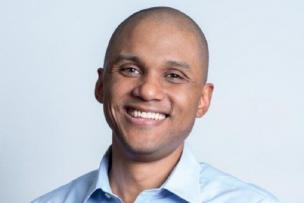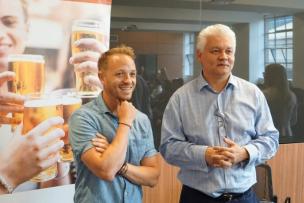This week we interviewed Jane Murphy, Google's MBA programmes specialist. Jane is based in Google's Dublin office where she plays an important role in Google's EMEA recruitment. She's also their university specialist for Ireland.
Jane started by saying that Google is always creating innovative programmes to attract the brightest and best candidates:“We want every candidate to know that Google is more than a job, it is a place where they can fulfil their career aspirations.”
What distinction does the company makes between MBA graduates and other graduates? “When we look for MBAs we go to schools that attract students with a minimum of five to seven years of previous work experience, which means these candidates bring knowledge coupled with experience.”
The MBAs that Google hires are for leadership roles, where having relevant experience is critical. MBA candidates often enter roles where they have to manage teams and are expected to do a variety of complex tasks.
On the other hand, as important as leadership skills are, Jane also made the point that their MBA candidates also need to have what she describes as the "full package" of skills. This includes strong interpersonal skills along with a genuine passion for the online industry.
So how does Google quantify and judge passion? Jane explained that while it isn’t necessary for MBA candidates to have a background in the industry, there are indicators that can be used to judge their enthusiasm: things like whether a candidate is using blogs, websites, Internet groups or different forms of social media. Even working in a company where they've helped to steer their marketing department towards using online tools can be a clear indication of passion.
Jane said that when Google is considering MBAs, it typically looks for people to enter roles such as business development, marketing, and leadership within the online sales side of the business.
It also looks to MBAs for managerial roles in project management, product marketing, financial analysis and business acquisition.
A candidate’s experience prior to their MBA is looked at in a lot of detail: “Many candidates who have previously worked in consultancy do not see a synergy with Google, yet we have actually hired a lot of candidates from this background into the company as they often bring a strong skillset with them. We like to utilize a candidate’s experience when they work for us.”
Jane then talked about Google’s scale of operation, for example the Dublin office where she works is the headquarters for Europe, The Middle East and Africa. This means that candidates not only get to utilize skills that they've acquired in the past but also develop new skills as they work with clients from different industries, cultures and backgrounds.
Jane added that there were some misconceptions about Google’s peer recruitment method: “A lot of people think it takes six to 12 months to get a job in Google, however in reality we’re very streamlined and it typically takes six to eight weeks. The interview process consists of a telephone interview, followed by a day on site where we do three to four one to one interviews.”
Concerning peer recruitment, Jane emphasised that at Google it’s very important that people get to meet their potential colleagues as a lot of the work is done in small team environments. Jane said, “When someone is being considered for a role, each employee who participated in the hiring process gets an equal say: this way we make sure we get the best fit for the team.” Jane made a point of saying, “Google isn’t just looking for brilliant candidates but also candidates that fit well into Google’s culture.”
We pressed her on how Google’s unofficial motto, ‘Don’t be evil’, affects their recruitment process. She responded by saying,
“Our recruitment is a high-touch process: this means we make sure that our candidates always have a strong relationship with one member of our recruitment team throughout the process. We also make sure we’re honest and transparent with our candidates.”
We then discussed the perks that someone hired at Google could expect. Jane explained how Googlers are generally very well fed. When giving some detail she said, “Benefits and perks vary in the different office locations but in the Dublin office alone, we have four really fantastic restaurants where Googlers can go for breakfast, lunch and dinner during the working week.”
There are also lots of facilities such as pool tables, games rooms and massage chairs where employees can collaborate with fellow Googlers or simply take some time to relax. Google also has a relaxed dress code which Jane summarised by saying, “you can be serious without a suit.”
One thing that Google takes very seriously is its staff development. One of the cornerstones of Google’s culture is to embed a desire for continual learning in its staff. There is a learning and development team dedicated to the development of Googlers that delivers a wide array of courses. According to Jane Google also has a very good study package for those who wish to pursue education further.
When we asked how Googlers keep focus on their core tasks with so many fantastic initiatives and facilities to distract them, Jane said that, “Google understands the need for work life balance. When people are happy they’re also productive. Some of the best ideas are generated over a game of foosball or pool with someone from a different department.”
Jane said that one of the biggest misperceptions that people have is that they think Google only looks to hire computer scientists or engineers. Google is actively on the look-out for people to fill roles in online marketing where people need good business acumen.
“Google isn’t just an Internet search engine. We have a whole portfolio of innovative products such as Android for mobile phones or AdWords for online advertisers. We’re really out to do nothing less than organise the world’s information and make it universally accessible and useful and we won’t be limited by boundaries to achieve this goal.
On 18 April 2012 BusinessBecause organised an MBA networking event with Jane Murphy at Google's London offices. Themed 'Google, gaming and getting ahead', the evening kicked off with a game theory talk by Manchester Business School professor Patrick McNutt followed by plenty of wine, canapes and discussion amongst pre-MBAs, current business students and alumni.
Interested in tech jobs? Read our interview with the folks at Rocket Internet, Europe's biggest tech incubator
RECAPTHA :
da
b8
11
48







